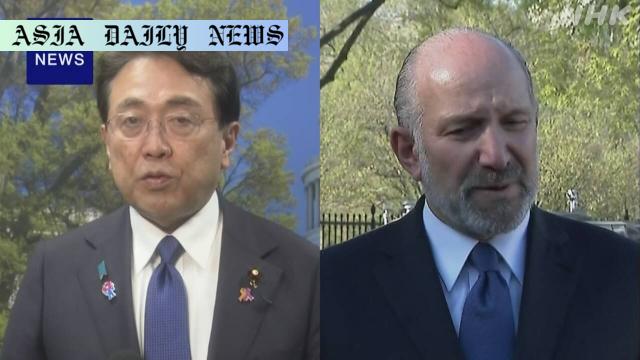Tariff Negotiations: Japan and US officials continue discussions to resolve tariff issues under complex economic and political dynamics.
- Key Point 1: Japan and US resolve to continue vigorous tariff discussions, seeking a mutually beneficial agreement.
- Key Point 2: Economic Minister Akazawa expressed progress but noted challenges in resolving tariff disputes under new measures.
- Key Point 3: On an international level, Japan remains proactive, aiming to negotiate details to benefit broader agreements.

Overview of US-Japan Tariff Negotiations
The current dynamics between Japanese and US tariff negotiations have captured the attention of the global economy. With the United States planning to impose a 25 percent tariff on Japanese goods starting from August 1, diplomatic efforts to mitigate potential economic disruptions are in full swing. Economic Revitalization Minister Akazawa Ryosei and US Commerce Secretary Howard Lutnick recently engaged in a 40-minute telephone conversation focused on finding mutually agreeable resolutions to the tariff impasse. This development plays a critical role in shaping the economic interactions between these two major world economies.
Progress Acknowledged, Challenges Persist
In the immediate aftermath of the talks, Minister Akazawa hinted at potential progress while underscoring the difficulties entailed in the ongoing negotiations. He expressed disappointment over the increment in tariffs despite the minor percentage increase but also emphasized the Japanese government’s commitment to pursuing discussions that safeguard the nation’s economic interests. Akazawa admitted that the road ahead is far from easy, especially given President Trump’s strong background as a tactician and dealmaker, which poses unique challenges for Japan in securing favorable resolutions.
Navigating Complex Economic and Political Contexts
The broader context of these tariff negotiations showcases the intertwined realities of economic policy and political strategy. Japan has signaled a willingness to employ multiple channels to engage the US and reach an agreement that ensures mutual benefits. Akazawa’s assertion that detailed negotiations must occur at the working level highlights the intricacies involved in creating a comprehensive agreement. These complexities underline the necessity for thoughtful, data-driven approaches to bridge gaps between economic aspirations and political directives, even amid evolving international trade landscapes.
Looking Ahead: Building Consensus
As Japan looks to the future of these discussions, the government aims to consolidate strategies that protect its national interests while contributing positively to global trade dynamics. While the potential for a breakthrough in leadership-level discussions remains uncertain, the underlying strategy involves laying a foundation of detailed negotiations that align with the interests of both nations. It is critical to ensure that these agreements not only resolve immediate tariff disputes but also set the stage for long-term collaboration and economic cooperation between Japan and the United States.



Commentary
The Geopolitical Impacts of Tariff Disputes
The emerging tensions surrounding tariff negotiations between Japan and the US reflect a broader trend in global trade policies. These disputes extend beyond purely economic interests and delve deeply into geopolitical strategies and projections of influence. By increasing tariffs, the United States disrupts not only economic flow but also complicates bilateral relations with a key ally. For Japan, navigating these challenging waters requires striking a balance between maintaining economic stability and fostering a cooperative relationship with its largest trading partner. This dynamic invites scrutiny on the impact of economic nationalism on international relations.
Japan’s Proactive Negotiation Approach
Japan’s decision to emphasize details over rapid agreements demonstrates wisdom in navigating complex economic negotiations. Minister Akazawa’s measured approach indicates an engagement strategy that prioritizes long-term benefits over short-term fixes. With President Trump known for his transaction-based negotiation style, Japan faces a formidable challenge in crafting a package that meets Washington’s expectations while safeguarding its interests. Transparent and patient diplomacy is crucial in addressing tangible economic consequences while also working towards broader agreements that sustain bilateral ties.
The Broader Economic Implications
The repercussions of an unresolved tariff dispute could extend beyond Japan and the United States. International supply chains, intricate trade agreements, and global market dynamics all stand to shift if negotiations fail to yield a productive outcome. For Japan, securing a deal not only benefits its immediate economic interests but also influences its standing within the Asia-Pacific region. As strategic players like China closely observe these interactions, the long-term impact of these negotiations could have ripple effects on alliance formations and trade structures globally.